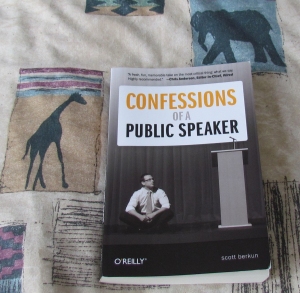Technical writers and public speaking?? a match made in heaven? We have the knowledge about and passion for our field. We can safely put one word after another without causing mayhem. But can we stand up and speak in front of a crowd? More importantly, what would we do when confronted by a chandelier?
To find out whether you can do it or not, try Scott Berkun?s book, Confessions of a public speaker. I?ve just finished reading the book, with great enjoyment and plentiful note taking.
Technical communicators who do it already
Anne Gentle, Janet Swisher, Tony Self, Rhonda Bracey, Char James-Tanny, Tom Johnson, Sue Heim, Joe Welinske, Ellis Pratt, and many more. All excellent speakers and presenters. Perhaps most people reading this post have a public-speaking story to tell, either of horror or of triumph. ![]()
Until two years ago, you could have blown me down with a feather duster if you?d told told me that I would speak at a conference. Then I met Joe Welinske and started blabbing about my love of documentation wikis. There was probably a lot of arm waving and even a bit of in-place leaping about. Joe quickly suggested that I speak at the next WritersUA conference. I remember silence. I probably went pale. But I must have said yes, because within a few months I found myself on stage. To my absolute astonishment, my presentation went reasonably well. Since then I?ve presented sessions at a few conferences, and I enjoy the experience more each time.
At work, our team has decided to investigate public speaking as a way of sharing our experiences with others and of learning from others too. I tweeted about this during a #tcchat on Twitter, and Andrew Frayling recommended the book, Confessions of a public speaker, by Scott Berkun. Andrew is right. It?s good.
The terrors of public speaking

"Confessions of a public speaker" by Scott Berkun
One of the very first things I learned from Scott?s book is that fear of public speaking is a good thing. It?s your body?s way of preparing for a challenge. Without it, how would you cope when ?a legion of escaped half-lion, half-ninja warriors fall through the ceiling and surround you, with the sole mission of converting your fine flesh into thin sandwich-ready slices?? (Page 16.)
Now, that may sound a bit of a stretch. But think again. Towards the end of the book is a set of stories of the situations some hapless speakers have faced. Dan Roam was on stage in Moscow when ?six balaclava-hooded and heavily armed OMON troops (Moscow equivalent of a SWAT team)? burst in, grabbed an audience member and marched out again. (Page 184.) That story makes the average tech comm conference seem a little quiet.
It is strangely comforting to read a list of things that have gone wrong for other speakers!
Another of the stories, called ?Watch your slides?, is told by Gerv Markham. His laptop with slides, and all his other luggage, was stolen in a subway station when he was on his way to give a presentation. Since then, Gerv always takes a cab.
Gerv?s experience reminded me of what happened just before my very first presentation ever. It was also my very first trip to the United States. I took a cab from the hotel, and unwisely let the cab driver put my laptop bag in the trunk with the rest of my luggage. When we arrived at our destination, the driver jumped out, grabbed my bags before I could get to them, perched the laptop bag on top of the suitcase, and then turned round to me for his fare. The laptop fell off the suitcase with a loud thump.
When I opened the bag, I found that the laptop casing was squewed, the DVD drive was permanently jammed open, and there was an ominous rattle coming from deep inside the computer. But, wonder of wonders, it booted up and worked. So I left it like that. I didn?t even try to fix the DVD drive or straighten anything at all, until the presentation was over and I was safely back in Sydney.
So, Gerv, cabs are not safe modes of transport for presentations either. ![]()
Good solid advice
Scott?s book is full of stories, and it?s full of tips too. The advice on page 19 rings true with me, about the importance of practising your presentation thoroughly. Page 21 has some great tips about how to prepare immediately before your speech.
I loved the description of the importance of a title. It ?divides the universe into what you will talk about and what you won?t?. (Page 61.) And there?s an inspiring description of the only moment when you?ll have the full attention of everyone in the room: the silence just before you start speaking! (Page 80.)
Scott reveals a mild obsession with and definite antipathy towards chandeliers. (Page 40-4.) But hey, we?re all entitled to our oddities. ![]()
The book emphasizes the importance of simplicity. This is something close to a technical writer?s heart too. On page 162, Scott explains that it is our duty as speakers to simplify and clarify our points. The audience should not be doing the hard work. We should.
Thank you Scott
Thank you for a good read! I?d like to be in a room and hear Scott speak, putting all these techniques into practice. Especially if there?s a chandelier in the vicinity. ![]()
Source: http://ffeathers.wordpress.com/2011/07/24/technical-writers-and-public-speaking/
anorexia diane sawyer tcc uw ironclad curb your enthusiasm season 8 harper lee
No comments:
Post a Comment
Note: Only a member of this blog may post a comment.